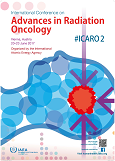Speaker
Tatsuji Mizukami
(Gunma University Heavy Ion Medical Center)
Description
**Introduction of the study;** The standard treatment for prostate cancer with bladder invasion which was classified very high risk according to the NCCN clinical practice guidelines in oncology version 1.2015 has not been established. There are few reports, and one of them reported that 44.6% of patients received neither the operation nor the radiation therapy. The carbon ion radiotherapy has a superior characteristic both biologically and physically, so it is important to search the therapeutic potential of the treatment. The purpose of this study is to report the experience of carbon ion radiotherapy for prostate cancer with bladder invasion.
**Methodology;** 807 prostate cancer patients were treated at Gunma University Heavy-ion Medical Center (GHMC) between March 2010 and September 2014, and 6 prostate cancer patients with bladder invasion, who underwent radical carbon-ion radiotherapy (57.6 Gy (RBE) / 16 fractions / 4 weeks) with concurrent androgen deprivation therapy were identified retrospectively. All patients were diagnosed as clinical T4N0M0, by using magnetic resonance imaging (MRI) and cystoscopy.Five patients received neoadjuvant and concurrent combined androgen blockade, followed by LH-RH agonist after carbon-ion radiotherapy. One patient received Gn-RH antagonist throughout the treatment period.
**Results;** The median follow up time was 42 months (range, 22 - 65 months). The local recurrence was observed in 1 patient. The Grade 1 acute genitourinary (GU) toxicity was observed in 2 patients. Grade 2 or higher toxicity and acute gastrointestinal (GI) has not observed in this analysis.
**Conclusion;** Carbon-ion radiotherapy with concurrent androgen deprivation therapy for prostate cancer with bladder invasion was effective and have no problem technically. It might be a useful treatment option for the very advanced prostate cancer.
**Methodology;** 807 prostate cancer patients were treated at Gunma University Heavy-ion Medical Center (GHMC) between March 2010 and September 2014, and 6 prostate cancer patients with bladder invasion, who underwent radical carbon-ion radiotherapy (57.6 Gy (RBE) / 16 fractions / 4 weeks) with concurrent androgen deprivation therapy were identified retrospectively. All patients were diagnosed as clinical T4N0M0, by using magnetic resonance imaging (MRI) and cystoscopy.Five patients received neoadjuvant and concurrent combined androgen blockade, followed by LH-RH agonist after carbon-ion radiotherapy. One patient received Gn-RH antagonist throughout the treatment period.
**Results;** The median follow up time was 42 months (range, 22 - 65 months). The local recurrence was observed in 1 patient. The Grade 1 acute genitourinary (GU) toxicity was observed in 2 patients. Grade 2 or higher toxicity and acute gastrointestinal (GI) has not observed in this analysis.
**Conclusion;** Carbon-ion radiotherapy with concurrent androgen deprivation therapy for prostate cancer with bladder invasion was effective and have no problem technically. It might be a useful treatment option for the very advanced prostate cancer.
| Institution | Gunma University Heavy Ion Medical Center |
|---|---|
| Country | Japan |
Primary author
Tatsuji Mizukami
(Gunma University Heavy Ion Medical Center)
Co-authors
Akiko Adachi
(Gunma University Heavy Ion Medical Center)
Hidemasa Kawamura
(Gunma University)
Hiro Sato
(Gunma University Heavy Ion Medical Center)
Hiroshi Matsui
(Gunma University, Urology)
Hiroyuki Katoh
(Gunma University Heavy Ion Medical Center)
Kazuhiro Suzuki
(Gunma University, Urology)
Kazuto Ito
(Gunma University, Urology)
Nobuteru Kubo
(Gunma University Heavy Ion Medical Center)
Takashi Nakano
(Gunma University Heavy Ion Medical Center)
Tatsuya Ohno
(Gunma University Heavy Ion Medical Center)

